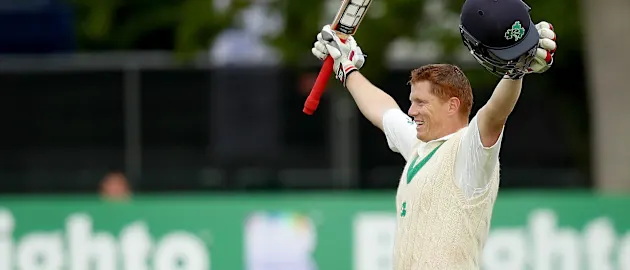Kevin O'Brien: Maestro of Malahide


When Kevin O’Brien became just the fourth man in history to make a century on his country’s Test match debut, in the process propelling his team into the fifth day at Malahide and giving them a real chance of victory against Pakistan, the cricket world cheered one of the great feel-good stories of recent times.
In the end, it was not quite enough, Pakistan inching home by five wickets. But if ever a cricket team has felt something akin to euphoria in the midst of defeat, it was O’Brien’s Ireland team after a stirring fightback in their inaugural five-dayer.
Here in conversation with Phil Walker, the hero of Malahide opens up on a surreal week, having the highest average in Test cricket history and what it all means for the future of Irish cricket.
As the dust starts to settle on a historic occasion at Malahide, has it begun to sink in yet?
It’s kind of starting to sink in. But still, you know, when I think about it, it’s quite unbelievable. But it was such a great occasion. Personally I did well, but the match in general was unbelievable. And we even had decent weather after day one!
Which was a miracle in itself!
I know! We were cursing the gods on that first day! But yeah, what a great occasion. And the crowds were just brilliant. It’s what Test cricket really is.
Taking it back to the days leading up to the match, what was the mood like? And were you able to get your head round it all, amidst all the symbolism and pageantry?
There was a massive increase in intensity at training. When we met on Tuesday morning, it just felt so different to a usual Ireland match. Obviously being the first Test, and the way the ground was built, people coming from everywhere, there was a lot of media attention… It felt so much bigger than normal. We were like kids on Christmas Eve on Thursday night. Everyone was giddy, jumping around and raring to go.
And the nerves? Was the team still able to focus and play naturally?
It was massively important to win the toss and bowl. Not just from a wicket point of view, but it gave us an opportunity to settle into the game. I know it sounds a bit defensive, but it gave us a chance to ease our way in, have a decent first session, get a couple of early wickets – and that settled us down a bit. It would have been difficult for the top-order to go out there on debut in our first Test and all of a sudden we’re something like 5/3, as we were in the first innings – it would have been almost game over.
You’ve still got to bowl well though…
Yeah, we obviously needed to put the ball in the right areas, and we’ve got one of the best county bowlers in the last 10 or 12 years in Murghty [Tim Murtagh]. He does what he does, and that’s why he’s been so good for so long.
You were 5/3 when you went out there in the first innings, which soon became 7/4. And you’re out there, scrapping away. Was it possible to focus on the next delivery, or was the spectre of a disaster an unavoidable thought?
To be honest, I’m a very bad and nervous watcher when I’m waiting to bat. But once I get out there, I’m fine. The situation wasn’t great on Sunday in that first innings but I was still very confident in myself and Paul [Stirling] to get us back into the game. To be fair, we both found our feet quite quickly. We put on 25 or 30 in a similar amount of balls, ticking the score over quite comfortably. Unfortunately, we lost a couple of quick wickets – bang bang – and I thought, ‘Jeepers, we could be bundled out for 60-odd’. And of course, Gary [Wilson] had injured his elbow on Sunday morning. He’d only just come back from the hospital and the reports weren’t good. I didn’t even know if he would be able to hold a bat, let alone come out and get 33 not out. That took an unbelievable amount of courage for him to come out, with one hand pretty much, and bat us back into the game.
And that evening session on the Sunday, when Ed Joyce and William Porterfield fought to the close, in darkening conditions, that unbroken 64-run partnership seemed to change the mood dramatically, and helped lay the groundwork for Monday…
It was actually one of the biggest partnerships of the game. Porty and Ed were absolutely class in that final session. And actually, it really brought us back into the game. I said at the time that it gave us an outside chance of a win. I said that if we could get 160-180 in front, then we’d have nothing to lose and all the pressure would be on Pakistan. That session was massively important for the game, but it was also important to show the world of cricket, and everyone watching – and finally ourselves – that we’re not out of our depth here, that we can handle ourselves at this level in our own conditions. It was an important session to win and we won it well.
And so to magical Monday. You talk about proving lots of things to yourselves as a team, but what do you know now about yourself as a Test match cricketer? You’ve got the highest average in the history of the game!
Growing up in Ireland, playing in the back garden, we always played Test cricket. I’ve always wanted to play Test cricket. I enjoy the longer form of the game from a technical and cricketing side, but it’s the physical side which I struggle with the most. I’m 34 now, I’ve played a lot of cricket, bowled a lot of balls. Every morning I wake up and I’m a little bit stiffer. It’s encouraging that I proved to myself that I can bat for five-and-a-half hours, and it’s not just going in and getting a quick fifty or sixty. It’s building a proper Test innings. It’s nice to show other people that there’s another side to my game than just going out to slog a few into the stands.
💯 HISTORY MAKER! 💯@KevinOBrien113 has our first ever Test century! 👏
— Cricket Ireland (@cricketireland) May 14, 2018
Take a bow! 🙌 #IREvPAK #BackingGreen pic.twitter.com/fmB4AK6Lp0
A few years back, you gave an interview to a magazine I once edited in which you said that while you enjoy the first-class format, it’s not really for you, and that your white-ball work is where you focus your time and energies. So it must be a profound thing for you personally to realise that you can transfer your skills into the toughest form of the game there is?
Yeah definitely, and I still stand by that statement I made a few years back. I’m not going to sit here now and say I love Test cricket now and it is my favourite format. I enjoy playing it, I enjoy the challenge of Test and first-class cricket and the different skills they need. But for me it’s still T20 and one-day cricket that I thrive on. I absolutely love playing T20s. But yeah, to be able to look back and say I’m comfortable with the longer format of the game – I can score runs, I can change my batting ‘philosophy’, and I can adapt to the game – it’s pleasing, but I’ve been doing that for a while anyway. You have to adapt your game to the situation even in 50 overs. My thinking is still the same in the longer formats, I’m still looking to be positive and score from ball one. I might not hit it in the air as much, and that’s something I learnt from the first innings! I said to myself in the second innings, ‘Keep everything on the ground’. My dad has been telling me that for years, ‘You can’t get out caught if you keep it on the ground’. So, 34 years later I’ve finally listened to him!
To the final morning then, Pakistan are suddenly 14/3, another 146 still to get… what was going through your mind at that point?
It was funny, because the only way we could potentially win the game is if we were bowled out, leaving them 160-180 to get. If we’d batted on past lunch we would have drawn the game, which would have been brilliant, but it would have been unbelievable if we’d won our first Test. From a positive side, we put ourselves into a chance of winning, and then at 14/3 you’re thinking ‘Murghty, just nip one more out’ or ‘Boydo [Boyd Rankin], just get one to crawl along the ground’ and we’re right in. But, you know, the two guys [Imam ul-Haq and Babar Azam] played well, they gave us a chance but we couldn’t take it. In fact, we dropped a couple of chances in both innings, which probably let them get above a par score in the first innings. We could have kept them to 250 and it could have been game on. Even when we were rolled over for 130 we wouldn’t have followed on.
It’s just amazing that we’re sitting here talking about the ebbs and flows of a Test match with all three results still possible on the last day, and that Ireland are one of the teams involved.
Exactly. And also, it’s very rare in Test cricket now that you go into the fifth day with all three results possible. There’s sometimes some dull draws – 600 plays 500 – or it’s all over after three days. This was a proper game. A good testament to Test cricket. And as you say, ebbs and flows – they had it, we had it – and in front of a good crowd all game. It just shows that Test cricket can thrive in countries if it’s promoted well and can produce good wickets that have a bit of everything.
Another photo for the history books, to mark the end of a fantastic occasion! ☘️🇵🇰#IREvPAK #SpiritOfCricket pic.twitter.com/G9c6dVE1SF
— ICC (@ICC) May 15, 2018
What does the future hold for this bunch of players?
The Future Tours Programme is huge for us. We’ll get to know the fixtures over the next five years, which will be fantastic from Cricket Ireland’s point of view, to be able to market them, get some revenue in and get the TV rights sorted. But from a playing point of view, we can actually stick them into our diary and we can plan as players and coaches. It gives the coaches more flexibility with regards to player rotation, looking to the future and blooding some new players, which is what the team needs, because a lot of us are 30-plus. Unfortunately for us, some of us are coming to the end of our careers. I’m 34 now, so I don’t know how long I can play Test cricket, but I’ll certainly keep going in the T20 format.
And as the dust settles on this week, what do you envisage as the knock-on effect for Irish cricket?
I think the Test will have an important impact on cricket. This is a new chapter in Irish cricket: The World Cup in ‘07 was the beginning; 2011-15 was the main part of it, when we were so successful at Associate level and with World Cup wins; and now this is the start of a new era. Test cricket. The Future Tours Programme. The Ireland cricket team has gone from a World Cup team that plays once every year in big games or once every four years in World Cups to now becoming a touring team. We’re going to have games every couple of weeks now, games every month, big series’, big winters away playing all the formats. One series a summer. One series a winter. It’s going to have a great knock-on effect for sure, and the Test match is just the start of that.
And for you personally? Have the calls started flooding in? A chat show here, opening a new supermarket there…
Ha! Yeah, maybe! Nialler [his brother Niall O’Brien] is my manager, so I’ll have to get him onto that! I’ve done a couple of radio interviews and a few media bits and bobs, so we’ll have to keep the word out there!


